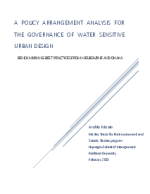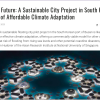About the Community Dialogue
Every 1-2 months the Water Adaptation Community Facilitators host an informal meeting for knowledge sharing, guided by a short presentation, which frames up solutions or good practices for mainstreaming water adaptation.
Register for this meeting here.
Format:
-
10-minute presentation
-
40 minutes of group dialogue (Participants- bring questions related to your water adaptation challenges, or share complementary good practice, or innovative ideas in the discussion)
-
10 minutes of updates and opportunites from the Water Adaptation Community Facilitator
About the Presentation:
Andile Moale MSc in Global Environment and Sustainability will present outcomes from her her thesis research project "Integrative governance of water sensitive urban design – a framework" to start our learning and discussion.
Water Sensitive Urban Design (WSUD) is a sub domain of Integrated Water Resources Management and is focused specifically on water sensitive management in urban areas. With that, factors such as engineering, urban planning and high rates of population growth become important for resilience building. As water management issues require collaboration among multiple industries, the governance of this resource often falls short as tradeoffs need to be made. The question that this study aims to answer is whether an actionable framework for WSUD can be created and implemented in various cities around the world?
To answer this question, the best practices that have improved WSUD in Melbourne and Dhaka are studies, with the goal of identifying barriers and conditions for WSUD. Melbourne’s policies have increasingly incorporated water cycle systems into urban management and Dhaka’s policies have slowly incorporated integrated water management since the 1980’s.
Through the policy arrangement approach, the discourses, actors, legislation, and resources that facilitate or hinder WSUD are studied to understand how best to govern this resource. One of the main facilitators are the development of a shared vision among multiple actors in various sectors. This can be done through collaboration and steering by the state. Implementation capacity needs to be created through prescriptive rules and performance-based standards, and financial viability must be strengthened. By the decentralization of implementation, multi-level network potential is created, and this improves action. Community engagement and behavioral internalization are also a factor. The conclusions made in this research suggest that implementation is a challenging factor in WSUD and can be improved through a good regulatory approach which offers and must consist of binding policy, which also offers consistency but allows room for flexibility to accommodate various changing, local contexts. Due to a high likelihood of uncertainty, regulation of this kind must also offer a high level of guidance and that should be done through a lead agency for coordination. Assessment tools along with clear and detailed guidelines on implementation can achieve broader livability objectives. Frameworks for policies tend to be complex and this makes it hard to create a one-size-fits all approach. Frameworks need to be structured in a way that is supported by implementation tools, without which the policy framework may not be effective.











Trending Discussions
From around the site...
“Absolutely interested! I'll connect via email to discuss reviewing and enhancing the Economic Analysis of Climate...”
Adaptation-related events at COP28 (all available to follow/stream online)
“Please check out these adaptation-related events taking place at COP28 - all available online (some in person too if...”
Shining a light for biodiversity – four perspectives to the life that sustains us. Four hybrid sessions.
“30 November to 19 December 2023 - Four Sessions Introduction The SDC Cluster Green is happy to invite you to the...”